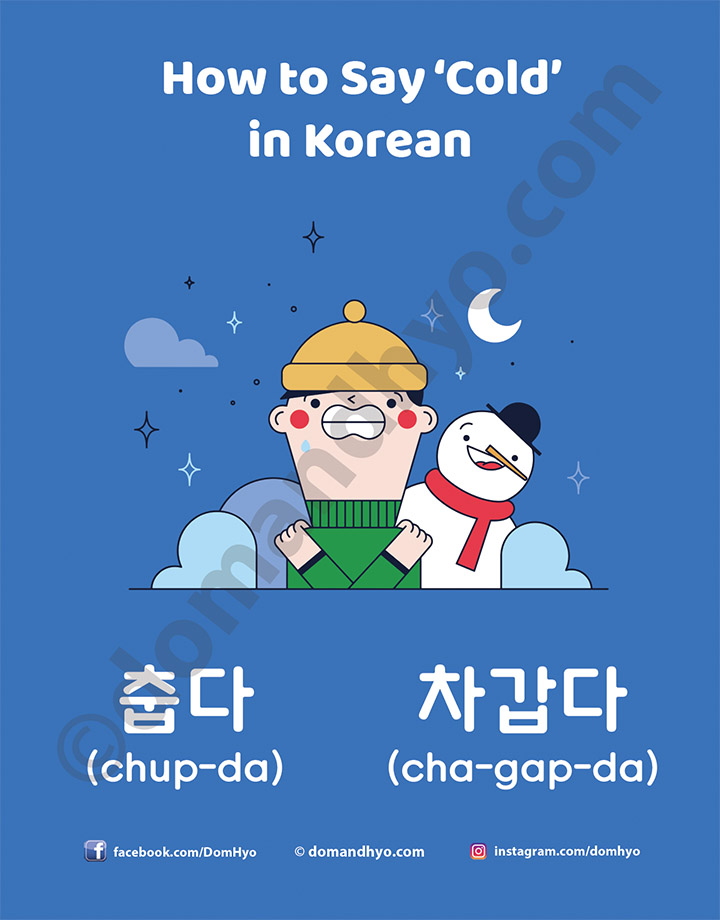
Korean is known for having many ways to say one action or feelings. For example, there are many ways to say the verb ‘wear’ depending what you are putting on. For the word ‘cold’ this also applies. In English, the word cold is used for the temperature of the weather, temperature of a drink, how your feet or hands feel, and so on. For Korean, this is different.
There are two words used for saying cold. When I frst started learning Korean, I switched tehse two words up all the time.
Let’s start with the first one.
춥다 (chup-da)
This one is used to describe cold temperatures. This applies to the weather, or the temperature becoming cold due to air conditioning.
Here’s how it’s conjugated (basic) along with the Romanizations for each:
Present tense
추워 (chu-weo) [informal] (and you will hear Koreans exclaim this constantly whenever the temperature is cold) = It’s cold.
추워요 (chu-weo-yo) [standard polite] = It’s cold.
춥습니다 (chup-seum-ni-da) [formal] = It’s cold.
Past Tense
추웠어 (chu-weo-sseo) [informal] = It was cold.
추웠어요 (chu-weo-sseo-yo) [standard polite] = It was cold.
추웠습니다 (chu-weo-sseum-ni-da) [formal] = It was cold.
Future Tense
추울 거야 (chu-ul geo-ya) [informal] = It will be cold.
추울 거예요 (chu-ul geo-ye-yo) [standard polite] = It will be cold.
추울 겁니다 (chu-ul geom-ni-da) [formal] = It will be cold.
And finally, here are some example sentences for 춥다:
나 너무 추워. (na neo-mu chu-weo) = I’m so cold.
한국은 추워요? (han-guk-eun chu-weo-yo) = Is it cold in Korea?
날씨가 안 추워요. (nal-ssi-ga an chu-weo-yo) = The weather here isn’t cold.
추워요 추워요. – 밖에 못 나가겠어요. (chu-weo-yo chu-weo-yo ba-kke mot na-ga-ge-sseo-yo) = It’s cold, it’s cold. I can’t go outside.
차갑다 (cha-gap-da)
This is the second word for describing the cold. The usage of this word applies to things like food, drinks, your limbs (skin, hands, toes, feet, or fingers for example), or personality. In general, if you also want to refer to things or objects as cold, you can use this one as well. You may get these two confused at first, but as you study more and use what you’ve learned on a daily basis, it will just start coming naturally to you.
Here are the basic conjugations for this word:
Present tense
차가워 (cha-ga-weo) [informal] = It’s cold.
차가워요 (cha-ga-weo-yo) [standard polite] = It’s cold.
차갑습니다 (cha-gap-seum-ni-da) [formal] = It’s cold.
Past Tense
차가웠어 (cha-ga-weo-sseo) [informal] = It was cold.
차가웠어요 (cha-ga-weo-sseo-yo) [standard polite] = It was cold.
차가웠습니다 (cha-ga-weo-sseum-ni-da) [formal] = It was cold.
Future Tense
차가울 거야 (cha-ga-ul geo-ya) [informal] = It will be cold.
차가울 거예요 (cha-ga-ul geo-ye-yo) [standard polite] = It will be cold.
차가울 겁니다 (cha-ga-ul geom-ni-da) [formal] = It will be cold.
And here are some examples for 차갑다.
발이 차가워요? (bal-i cha-ga-weo-yo) = Are your feet cold?
왜 이렇게 차가워요? (wae i-reo-ke cha-ga-weo-yo) = Why is it so cold?
손이 너무 차가워요. (son-i neo-mu cha-ga-weo-yo) = My hands are so cold.
왜 이렇게 말투가 차가워? (wae i-reo-ke mal-tu-ga cha-ga-weo) = Why do you sound so cold?
In our next lesson, we’ll cover how to say ‘hot’ in Korean.
